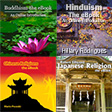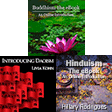Buddhism–The eBook
An Online Introduction
by Charles Prebish and Damien Keown
Buddhism Online:
Essay Questions
- Chapter 1
- Essay questions
-
- How does Buddhism understand the nature of the cosmos with reference to a) time and b) space?
- What are the "Six Realms of Rebirth" and how are they described in Buddhist teachings?
- Explain the main features of karma as understood in Buddhism.
- ↑
- Chapter 2
- Essay Questions
-
- What are our main sources of information about the Buddha's life?
- To what extent did the Buddha put his own teachings into practice in the course of his life?
- Explain the term "hagiography" and discuss how far it can be applied to the traditional sources for the Buddha's life.
- ↑
- Chapter 3
- Essay Questions
-
- Explain Buddhist teachings about suffering and its arising,
- Explain Buddhist teachings about the end of suffering and the path that leads to it.
- What did Buddha mean when he taught that there is "no self" (anatman)?
- ↑
- Chapter 4
- Essay Questions
-
- Compare the role of Buddhist monastic life in early Buddhism and in modern, urban, technological society.
- Can Buddhist behavioral codes remain relevant in the modern world? If not, why? If so, how?
- What common features would you imagine Buddhist monks and nuns from Sri Lanka to share with their Chinese counterparts? In what ways would their lives be different?
- ↑
- Chapter 5
- Essay Questions
-
- To what extent did the early councils succeed in their aims?
- What is the significance of the stupa in Buddhism?
- Does Tantra represent the high point or the low point of Indian Buddhism?
- ↑
- Chapter 6
- Essay Questions
-
- Explain Mahayana "Buddhology" in the light of earlier notions about the nature of Buddhahood.
- Carefully explain the stages of the bodhisattva path and explain how the stages employ the various perfections.
- How does the Yogacara theory of consciousness compare to other Buddhist theories of "mind?"
- ↑
- Chapter 7
- Essay questions
-
- Compare and contrast the meditational systems of early Buddhism, Mahayana, and Tantric (or Vajrayana) Buddhism.
- Explain how the system developed by Buddhaghosa works in taking the practitioner from the unenlightened to the enlightened state.
- Discuss the role of the meditation teacher in the various Buddhist traditions? Can someone productively and effectively learn meditation on their own?
- ↑
- Chapter 8
- Essay Questions
-
- What would you say are the main features of Buddhism in Southeast Asia? What variations, and what common themes can be identified?
- What is meant by the "Great Tradition" and the "Little Tradition?" Which is the most important? Give an example of a belief or practice associated with the "Little Tradition."
- Of the four countries discussed in this chapter, is there one that seems to you to be the "odd man out?" Which is it, and why?
- ↑
- Chapter 9
- Essay Questions
-
- Why were Pure Land and Ch'an Buddhism able to survive the anti-Buddhist persecution of 845 C.E. better than the other Chinese Buddhist schools?
- Which are the strongest and most successful Buddhist schools in Japan, and how have they achieved that status?
- How has Korean Buddhism changed in the modern world?
- ↑
- Chapter 10
- Essay Questions
-
- Discuss the sectarian traditions in Tibetan Buddhism in terms of their histories, doctrines, practices, and lineages.
- When the Communist Chinese took over Tibet, many Tibetan refugees fled to a life of exile in other countries. Given the character of Tibetan Buddhism, how would you expect these refugees to adjust to life in other countries?
- Choose any three famous figures in Tibetan Buddhist history and explain why their role is critical to the development of Tibetan Buddhism.
- ↑
- Chapter 11
- Essay Questions
-
- How can we determine whether Buddhism has been transplanted into rather than onto western soil?
- Compare and contrast the various Buddhist practices employed in Western Buddhist communities. Which ones are most likely to succeed, and why?
- To what extent does Buddhism's success in the West depend on the development of a broadly based ecumenical movement?
- ↑
- Chapter 12
- Essay Questions
-
- Do you think socially engaged Buddhism is sufficiently distinctive to be recognized as a new "vehicle" (yana)?
- To what extent do groups like the Buddhist Peace Fellowship represent a new kind of Western sangha?
- What do you think engaged Buddhism has anything to contribute to contemporary social and political issues such as human rights and ecology?
- ↑
- Chapter 13
- Essay Questions
-
- What is the place of ethics in Buddhism, and what are the most important Buddhist virtues and moral values?
- In what way are the ethics of a bodhisattva thought to be superior by Mahayana Buddhists?
- How should Buddhists respond to terrorist atrocities like 9/11?
- ↑
- Chapter 14
- Essay Questions
-
- Trace the development of Buddhist Studies as an academic discipline from its earliest beginnings to the current time.
- Compare and contrast European and American contributions to the study of Buddhism.
- How will the recent and future advances in information exchange technology change the discipline of Buddhist Studies?
- ↑



